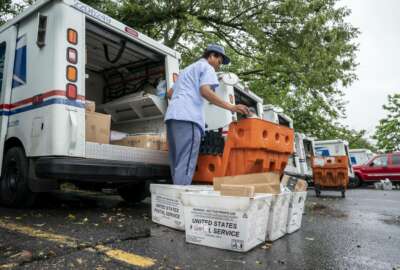To listen to the Federal Newscast on your phone or mobile device, subscribe in PodcastOne or Apple Podcasts. The best listening experience on desktop can be found using Chrome, Firefox or Safari.
- $360 million. That’s how much the Environmental Protection Agency has agreed to pay the state of Utah to resolve claims stemming form the Gold King Mine spill back in 2015. EPA says it will also strengthen Utah’s involvement in the agency’s work to address contamination at the Bonita Peak Mining District Superfund Site, which includes the Gold King Mine and other abandoned mines.
- The State Department’s acting inspector general abruptly resigned yesterday. Stephen Akard’s departure comes three months after President Trump fired State’s Senate-confirmed IG, Stephen Linick. The administration hasn’t explained the reasons for Akard’s resignation or Linick’s firing. In recent days, House Democrats subpoenaed the State Department for testimony as part of their investigation into Linick’s termination. (Federal News Network)
- Congress and the Trump administration have yet to reach a deal on the next coronavirus spending bill, but 130 members of the House want the final bill to include resources for the Postal Service ahead of the November election. House Transportation and Infrastructure Committee Chairman Peter DeFazio (D-Ore.) led lawmakers in demanding $25 billion for USPS, and a rollback of cost-cutting operational changes that have led to some delays in mail delivery. Senate Minority Leader Chuck Schumer (D-N.Y.) and House Speaker Nancy Pelosi (D-Calif.) met with Postmaster General Louis DeJoy to discuss these issues. (Federal News Network)
- More employees may go back to the office at the Environmental Protection Agency this week. The EPA entered phase two of its reopening plan this week for its headquarters in Washington D.C. and region offices in New England. The agency says 150 employees returned to their offices in the national capital region during phase one. It downplayed how many employees will return to EPA offices during phase two since telework is still an option. But EPA unions say the reopening is reckless. They say EPA data doesn’t meet the agency’s criteria to move to the next phase. EPA says those metrics are just a part of the agency’s reopening decisions. (Federal News Network)
- A scholar’s proposal could improve a contract award protest method vendors mostly believe is stacked against them. GW law school prof Christopher Yukins’s report to the Administrative Conference of the United States has vendors watching. He’s proposing changes to agency level protests, which contractors avoid by going to other protest venues. One of Yukens idea is to have a third party in the agency hear protests instead of the contracting staff that made the award in the first place. D.C. protest attorney Terry O’Connor likes that idea, saying he’s never won a post-award, agency level protest.
- U.S. Special Forces can move ahead with a contract that could be worth to close to $1 billion. The Government Accountability Office denied a bid protest from Patriot Defense Group for a consulting contract to help with SOCOM’s enterprise requirements, which has a ceiling of $950 million. GAO found the company did not clearly certify past performances in their original proposal.
- The Pentagon announced two big, new contracts aimed at getting a coronavirus vaccine distributed across the country. In the first contract, the Defense Department and Health and Human Services awarded more than $1 billion to Johnson and Johnson to start manufacturing 100 million doses of its vaccine candidate. That vaccine is still in clinical trials, but officials want it ready for distribution right away if the trials prove successful. Separately, DoD awarded contracts worth $104 million to start production of 500 million safety syringes over the next year. Those went to six separate companies, and the syringes will be added to HHS’s strategic stockpile as they’re manufactured.
- Cybersecurity personnel have a new tool to chart their careers in the federal workforce. The Cybersecurity and Infrastructure Security Agency released its Cyber Career Pathways Tool, an online platform that breaks down federal cyber work into five different sets of skills. It also highlights some of the core attributes of 52 cyber positions identified in the NICE Cyber Workforce Framework. CISA worked with the departments of Defense and Veterans Affairs to develop the career tool.
- One more agency received an “A” on the House’s IT modernization scorecard after all. The U.S. Agency for International Development joins the General Services Administration as the only agencies to receive a top mark on the Federal IT Acquisition Reform Act or FITARA scorecard. A calculation error caused USAID’s grade to come out to a B, but on second look by GAO and the House Oversight and Reform Subcommittee on Government Operations realized the agency earned an “A.” This is the fourth time USAID received a top score on the FITARA scorecard in 10 grading periods. (Federal News Network)
- GSA is ready to migrate another system to its new acquisition portal. The Federal Procurement Data System, or FPDS, reported functions will complete its migration to the Beta.SAM.gov portal on October 17. The General Services Administration announced its plan after determining that the soft launch started in March was successful. The FPDS functions that are moving include static, standard, administrative and ad hoc reports. GSA says the rest of FPDS functionality will remain in place at FPDS dot gov, which is not being retired at this time. During the soft launch period, GSA ran both the new and old systems in parallel and fixed any problems based on feedback from customers.
Copyright
© 2025 Federal News Network. All rights reserved. This website is not intended for users located within the European Economic Area.


